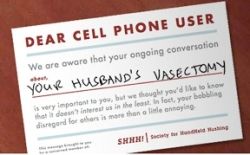Expert: Cell Phone Etiquette 101

Yesterday's news that the European Union approved in-flight calling got me thinking about cell phone etiquette. Thank goodness, a spokesperson for the U.S. Federal Aviation Administration said it has no plans to remove the ban here. While I haven't flown with many Europeans, I already know that Americans + cell phones + enclosed spaces = obnoxiousness squared. I'm guessing the same is true of Europeans: Lufthansa, for one, has said it will not allow voice calls on its planes. (Air France, to be fair, launched an in-flight calling trial even before the EU made its announcement.)
So, cell phone etiquette. I spoke to Peter Post, a director of the Emily Post Institute and author of The Etiquette Advantage in Business, and asked him to walk me through the dos and don'ts of using a cell phone in public. Here's what he said:
What are the tenets of good cell phone etiquette?
To be a master, but not a slave to it. That’s the best way I can describe it. If your use of that phone is going to bother someone around you, then be a master of it and turn it off. Don’t use it.
What are the worst things people do when using a cell phone in public?
They excuse themselves. They say, “I know I shouldn’t be using this phone, but it’s important. I have an excuse. I have a reason why I need to use it.” They talk too loud. They talk about things they shouldn’t talk about. My personal pet peeve is ringers that are either too loud or have absurdly ridiculous ringtones. My phone is set to vibrate at all times—it’s good so that half the people in the room don’t go diving for their phone.
What’s the etiquette for taking a call when you’re at a restaurant?
Everybody forgets to turn off phones, including me. When that happens—and it will happen to you—it’s how you handle it that’s a mark of if you’re doing something considerate. Quickly open and close it so it shuts off. If it’s a call that you’ve been expecting and you’ve alerted the people around you that you’ve been expecting a call, you excuse yourself. But at a restaurant, you don’t just take the call.
How do you respond if someone’s cell phone use is irritating you?
That’s a real dangerous thing. When you criticize a person who is a stranger in a situation, that criticism can lead to a bigger problem than them talking on their cell phone. We don’t recommend that you tap that person on the shoulder. The easiest thing: If I’m in an airport terminal, I get up and move my seat.
What if it’s Amtrak and you’re in an enclosed space?
You can move to a different spot. Move to another cabin if you have to. The second alternative is, in a lot of those kinds of situations, they have quiet cars. The trains really respect the quiet cars. The conductors come through and if someone's using their cell phone, they tell them, “If you don’t stop you’re going to have to leave this car.” They should make more quiet cars. It was like smoking on airplanes and they put smokers on the back of the plane and the section got smaller and smaller until they said, “No smoking.”
Stay in the know with Laptop Mag
Get our in-depth reviews, helpful tips, great deals, and the biggest news stories delivered to your inbox.
Do you think there’s a difference between American and European etiquette?
I think there are differences in the way different cultures handle themselves. Are Americans a little bolder? I think that’s probably true. We’re probably more in your face. It still doesn’t mean that I think it’s a good idea to accost a stranger and criticize their behavior. Better to ask the stewardess, or conductor, or maître d’. That’s the best way to handle a stranger’s abuse of something like a cell phone. On an airplane you have to sit next to this gabby person for five hours. And I don’t buy the idea that business people are so busy that they have to be in touch for those three hours. Businesses ran fine for hundreds of years without cell phones.
Do they follow different rules regarding public cell phone use?
For specific rules, they have differences—how someone might hold a fork, whether or not you hold a chair for a woman when you sit down at a table. But the underlying principles that drive etiquette—to be considerate, respectful, and honest—that’s the same around the world.
